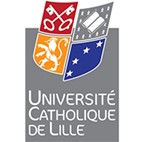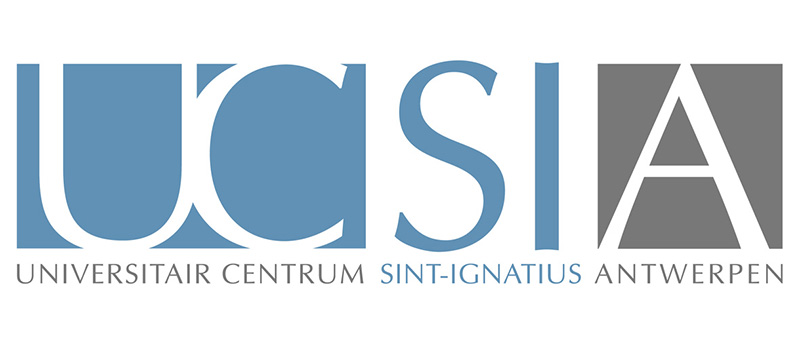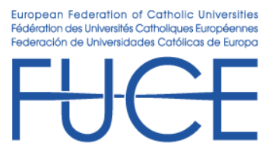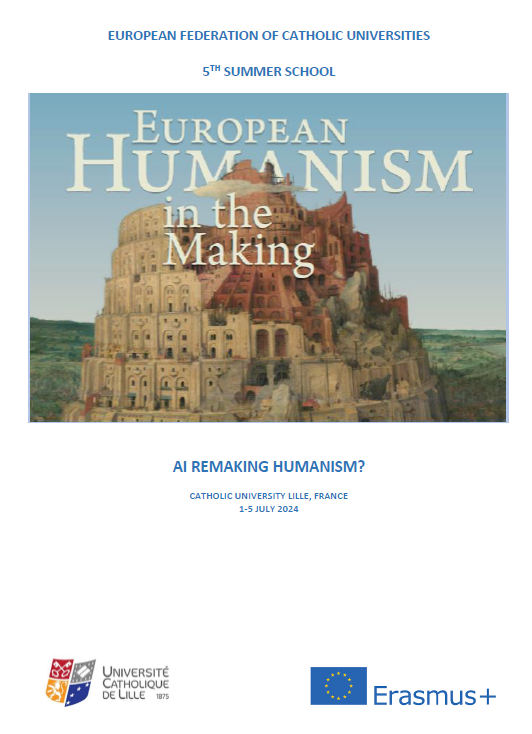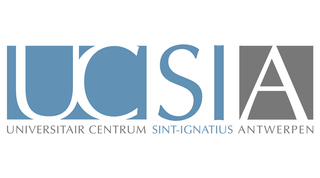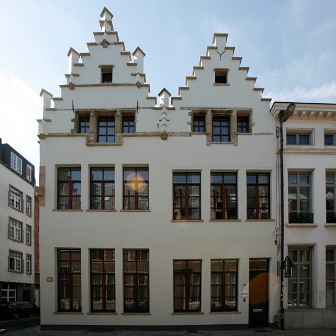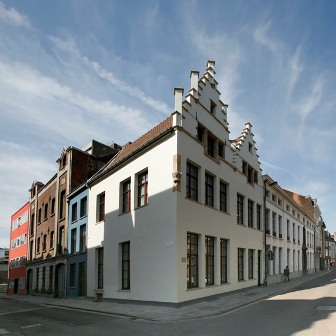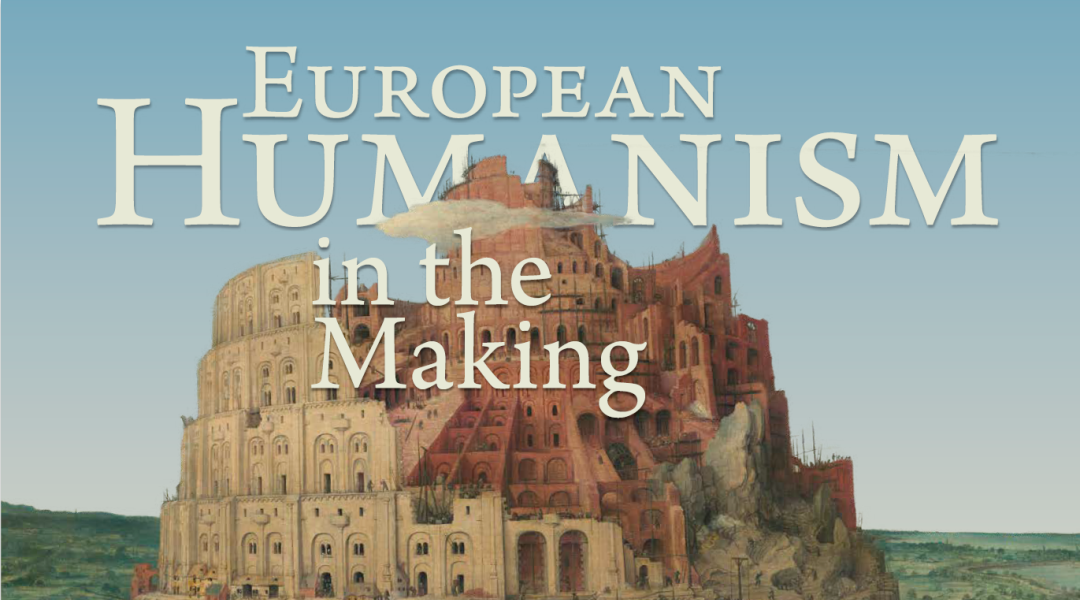
AI Remaking Humanism?
FUCE Summer School
1-5 July 2024
FUCE
European Federation of Catholic Universities
The fifth edition of the summer school ‘European Humanism in the Making’ of the Federation of Catholic Universities in Europe and Lebanon (FUCE), coordinated by the University Centre Saint-Ignatius Antwerp (UCSIA), took place on the campus of the Catholic University of Lille (UCL) from Monday July 1st until Friday, July 5th 2024.
After 4 editions, of which 3 were hosted by the LUMSA university of Rome (in 2019 & 2022 in Gubbio and in 2023 in Palermo) and 1 was held online (in 2021) another member institute of the FUCE takes over to host the upcoming 3 editions.
Up till now 115 (2nd and 3rd year) bachelor students from 30 member universities participated in this international exchange, reflecting with their peers from Lebanon, the EU and wider Europe, on the cultural, religious and philosophical foundations of the European project as a basis to rethink its future.
Each year a selection of students voice their concerns and hopes for Europe in a public (online) panel debate ‘MyEurope’.
To re-boost Europhilia as an antidote against widespread Europhobia, Europeans have to reconsider anew those structural ingredients and conquests that have been the driving pillars of European life, one such pillar being humanism.
Inspired by the appeal made by Pope Francis, on accepting the Charlemagne Prize in May 2016, for the recovery of a lost – or maybe never fully recognized – ‘soul’ of Europe, based on the agenda for a new humanism resulting from historical knowledge and the ethical recollection that it can foster collectively, the course programme is entitled ‘European Humanism in the Making’. In doing so it wants to address his question “What happened to humanist Europe, the defender of human rights, democracy and freedom?” and take it further to tap into historical roots as bearers of future prospects for the European project.
Courses
The course content of this interdisciplinary five-day programme was developed by a team of 5 professors (Sarah Durelle-Marc from UCL, Peter Hanenberg from the Catholic University of Lisbon, Ali Mostfa from the Catholic University of Lyon, Michael Shortall from St.-Patrick’s Pontifical University, Maynooth, Ireland and Fernando Ariza from CEU San Pablo in Madrid) and consists of five courses (for each course an additional guest speaker is invited) structured in two parts:
PART I – Historical and Cultural Roots: Implications for Europe Today
I. Contribution of History to European Consciousness
II. Literature, the Arts, Translation and European Identity
III. European Enlightenment and the Islamic Heritage
PART II – Social and Political Construction: Implications for the Future of Europe
IV. European Social Humanism
V. Creative Leadership & Civic Engagement in Action
This was the FUCE Summer School 2025 …
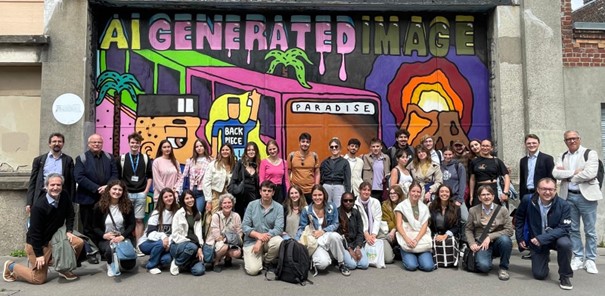
Co-funded by the Erasmus programme, the interdisciplinary group of 30 bachelor students from 9 Western European, 3 Eastern European and 3 Lebanese universities and the team of eight teachers met online for a first session in May. Professor of ethics Paolo Monti introduced the students to the topic. He stimulated an exchange of ideas by asking how AI impacts their lives and what it means for authorship and creativity.
For its fifth edition, the summer school found a new home at the Université Catholique de Lille which accepted to host a new three-year cycle. The first cycle was hosted by LUMSA University in Italy. Thanks to the active involvement of the International Relations department, the organization has gained momentum through a more structured approach of application and communication procedures and facility management.
Opening session on the impact of AI on humanism
In the first week of July, they were warmly welcomed at the campus by Thierry Magnin, the vice-rector for humanities, theologian and physicist. He initiated the idea of the summer school during his presidency of FUCE. He opened the proceedings with a public lecture on AI challenging European humanism. He addressed the questions of how we can preserve our freedom of thought and action while benefitting from new forms of intelligence in our striving for the common good and how AI is changing our relationship to reality, our approach to science and our conception of what it means to be human.
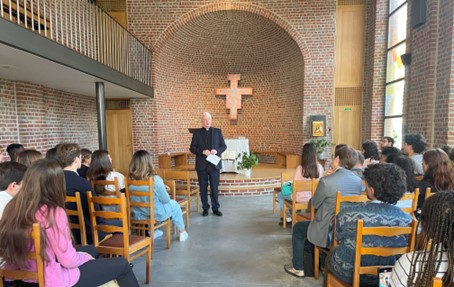
Theoretical courses
Applied activities
This theoretical approach was deepened in applied activities in the afternoon, such as group discussions, a writing class and a visit to the virtual lab. A trip to Brussels, with a visit to the House of European History Museum and the Parlamentarium, gave additional insight into the contemporary workings of the European institutions. In the Chapel of Europe, the European nuncio, Msgr. Noël Treanor, addressed the students and informed them about the current policy issues being debated at the European level. In the evening, the group joined the graduation ceremony of the European Leadership Programme of the Jesuit European Social Centre, a training programme for young future leaders of Europe. This gave the summer school students a sense of how they, as members of the new generation, might also contribute to the social construction of Europe. This aspect was further elaborated in a presentation of the award-winning community service-learning project the UCL law faculty has initiated: a bus for mobile juridical advice with volunteer lawyers and students going to communities that have little access to legal support.
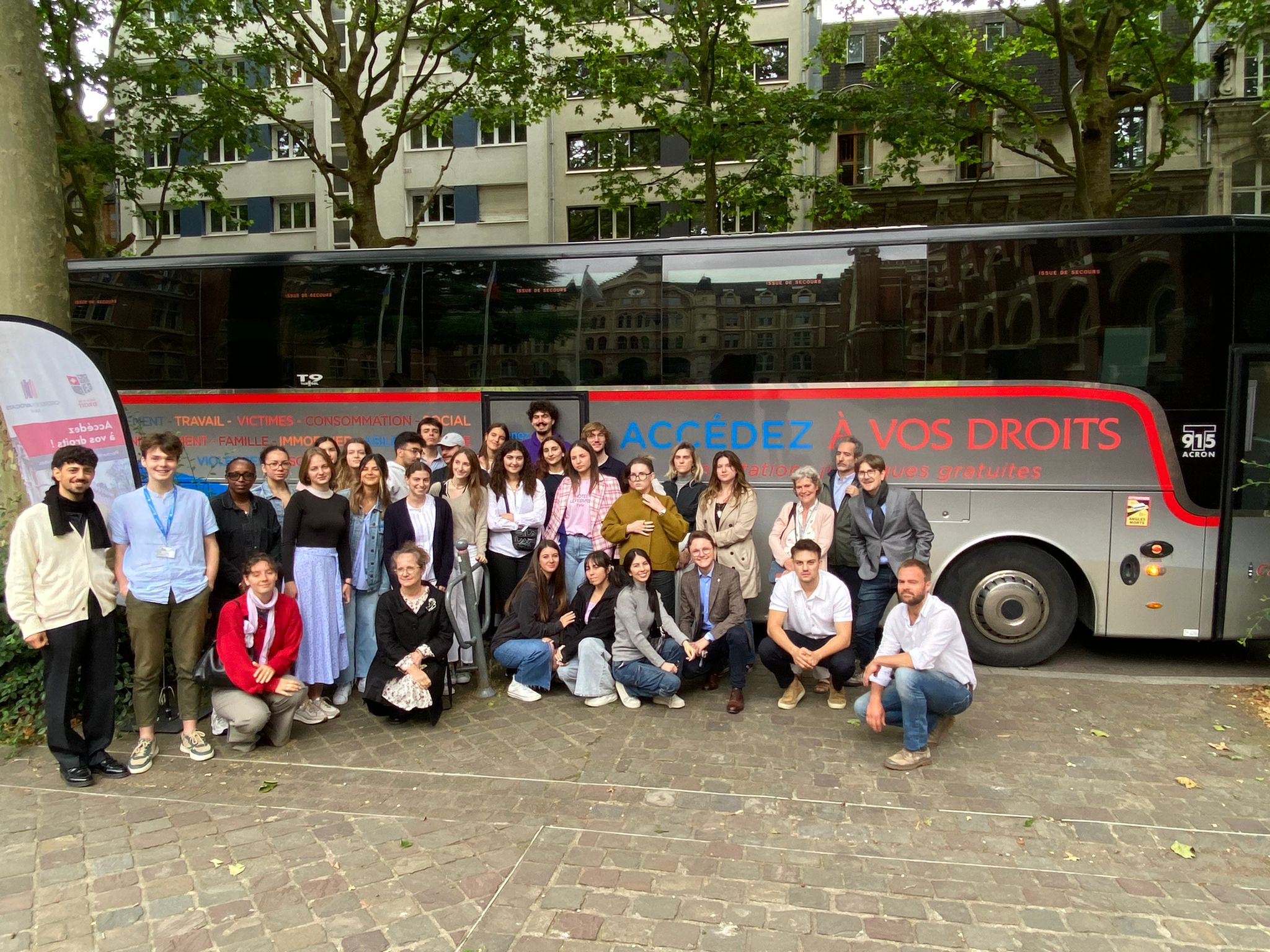
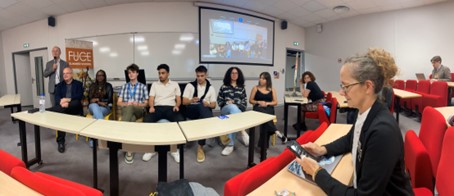
MYEurope – Panel session with students
The summer school students themselves were invited to take the floor and share their reflections in a closing session where they presented their group work and the dystopian stories they had composed. Some of them shared their vision for the future of Europe in a public panel, while all of them completed a portfolio, called travelogue, documenting their individual trajectory throughout the course.
In the public panel ‘My Europe’, students first highlighted the context from which they spoke: from countries voting for extremist parties, over euro-sceptic governmental regimes, to non-EU regimes with European aspirations. Then they discussed the potential of Europe as a peace project in light of ongoing conflict and war. They voiced their fears in defence of the values Europe stands for (or should stand for), loss of faith in politics (democracy means nothing to older generations in Eastern Europe), loss of belief in values such as solidarity (stop using it as a cliché phrase from a superior stance), Europe not offering a safe haven to migrants and engendering new forms of inequality. They reflected on how artificial intelligence impacts their education and job opportunities and what values should accompany beneficial use of these new technologies. The panel session was concluded with a message of hope in the belief that new generations can creatively overcome these new barriers, taking into account the lessons from the past.
Feedback from the students
In their evaluation, students especially valued the exposure to new ideas from different cultures, which for many was a first intercultural experience. They learnt to suspend their own judgement, listen to other experiences and rethink their pregiven perspective. It left them with more questions than answers, which they found enriching in defining their own position. They felt challenged to think about what Europe means to them. On the topic of AI, they asserted taking account of the advantages and disadvantages, while not refraining from using it, but learning to use it in a more effective and ethical way.
Overall, as stated by one of the students: ‘The summer school was a transformative experience that allowed me to feel both more European and more human. I felt connected to all the students in a profound manner and I truly believe I became a better person. It was amazing to learn so much in just one week, and to be filled with energy for the next chapters of my life.’
Student Testimonials
Organisers & Partners
FUCE
European Federation of Catholic Universities
UCSIA vzw
University Centre Saint-Ignatius Antwerp
Contact
Barbara Segaert
Project Coordinator UCSIA
Europe & Solidarity
E | barbara.segaert@ucsia.be

